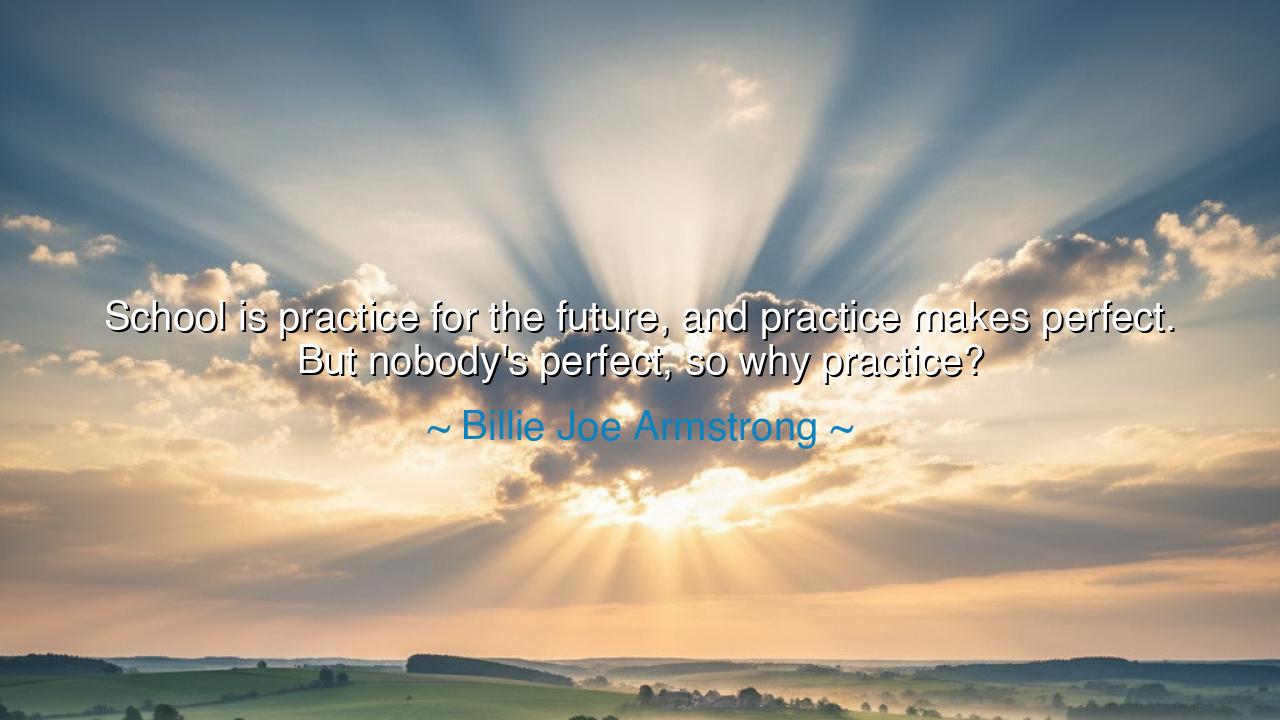
School is practice for the future, and practice makes perfect.
School is practice for the future, and practice makes perfect. But nobody's perfect, so why practice?






“School is practice for the future, and practice makes perfect. But nobody’s perfect, so why practice?” Thus spoke Billie Joe Armstrong, the spirited voice of rebellion and reflection, whose music has long carried the anthem of those questioning the structures of modern life. In this seemingly playful paradox lies not mere humor, but a deep philosophical challenge—a cry from the soul that demands we reconsider the nature of learning, perfection, and purpose. His words, though born in the age of punk rock, carry the timeless wisdom of the philosopher and the poet: that to live well, one must not only learn how to practice, but also question what we are practicing for.
The origin of this quote springs from Armstrong’s youth and worldview. As the frontman of Green Day, a band that gave voice to the restless spirit of a generation, he often spoke out against conformity and hollow ambition. He saw how many young minds were shaped not by curiosity, but by obligation—trained to memorize, to obey, to strive for a perfection that could never exist. His jest, “why practice?” was not the laziness of apathy but the laughter of awakening. It is the question every wise soul must ask: If perfection is unattainable, then what is the true purpose of effort?
To call school “practice for the future” is to admit that society often treats life as rehearsal. From childhood, we are told to prepare—to prepare for grades, for careers, for success. Yet in that endless preparation, many forget to live. Armstrong, through his irony, unmasks this illusion. If perfection is the goal, then the game is rigged from the start, for no human being is perfect. But if the goal is growth—if practice itself is the art, and not the means—then every mistake, every failure, every imperfection becomes sacred. In that realization, the rebel becomes the sage: practice not to be perfect, but to be present, alive, and ever becoming.
History gives us many who understood this truth. Consider Leonardo da Vinci, who filled thousands of pages with sketches, inventions, and unfinished dreams. He pursued perfection and never attained it—yet in that pursuit, he touched eternity. His art was not practice for a future masterpiece; each work was the masterpiece of that moment. So too with Armstrong’s insight: when we cling to perfection as the destination, we poison our joy. But when we embrace imperfection as part of the journey, every act of learning becomes an act of creation. Perfection is not the goal of practice; evolution is.
Armstrong’s question, then, is a challenge to all who live by rigid systems. “Why practice?” he asks—and behind that question lies a deeper one: “Why live by rules that deny our humanity?” For what is the value of education that teaches obedience but not wonder? What is the worth of work that demands flawlessness but denies fulfillment? His tone may be sardonic, but his spirit is ancient. Like Socrates, who asked questions to awaken thought, Armstrong provokes the listener to see the absurdity of striving without meaning. To rebel, in his sense, is not to reject learning, but to demand authentic learning—to practice not for perfection, but for truth.
And yet, there is wisdom even in his jesting despair. For though nobody is perfect, practice remains the lifeblood of mastery—not mastery over others, but over oneself. The act of practicing, of trying, of failing, and trying again, is not wasted. It is how the spirit grows strong. The artist who paints imperfectly, the student who learns despite confusion, the dreamer who builds even as the world doubts—these are the ones who honor the true meaning of practice. They do not seek perfection; they seek expression. And in that, they find a kind of perfection beyond flawlessness: the perfection of authentic effort.
So, my listener, take this as your lesson: do not practice to be perfect—practice to be alive. Do not learn merely to succeed—learn to understand, to connect, to create. The schools of the world may tell you to prepare for the future, but remember that the future is already here, in every breath, every choice, every act of courage you take. The perfection that eludes you is not your enemy; it is your teacher. Let imperfection be your companion, and it will lead you not to despair, but to depth.
And thus, in the spirit of Billie Joe Armstrong, question what you are told to chase. Laugh at the illusion of flawlessness, and embrace the freedom of imperfection. For life itself is not a rehearsal—it is the great performance already underway. And the greatest act of all is to stand upon its stage, imperfect yet unafraid, practicing not for perfection, but for truth.






AAdministratorAdministrator
Welcome, honored guests. Please leave a comment, we will respond soon